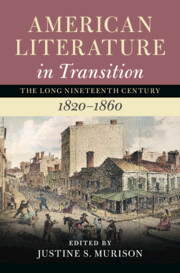Book contents
- American Literature in Transition, 1820–1860
- Nineteenth-Century American Literature in Transition
- American Literature in Transition, 1820–1860
- Copyright page
- Contents
- Figures
- Contributors
- Series Preface
- Acknowledgments
- Chapter 1 Introduction
- Part I Fractures and Continuities
- Part II Forms and Formats
- Part III Authors and Figures
- Chapter 17 Apess/Sedgwick
- Chapter 18 Child/Thoreau
- Chapter 19 Douglass/Walker
- Chapter 20 Emerson/Poe
- Chapter 21 Fuller/Stowe
- Chapter 22 Hawthorne/Winthrop
- Chapter 23 Melville/Whitman
- Chapter 24 Harper/Stewart
- Index
Chapter 18 - Child/Thoreau
from Part III - Authors and Figures
Published online by Cambridge University Press: 09 June 2022
- American Literature in Transition, 1820–1860
- Nineteenth-Century American Literature in Transition
- American Literature in Transition, 1820–1860
- Copyright page
- Contents
- Figures
- Contributors
- Series Preface
- Acknowledgments
- Chapter 1 Introduction
- Part I Fractures and Continuities
- Part II Forms and Formats
- Part III Authors and Figures
- Chapter 17 Apess/Sedgwick
- Chapter 18 Child/Thoreau
- Chapter 19 Douglass/Walker
- Chapter 20 Emerson/Poe
- Chapter 21 Fuller/Stowe
- Chapter 22 Hawthorne/Winthrop
- Chapter 23 Melville/Whitman
- Chapter 24 Harper/Stewart
- Index
Summary
This essay reads Lydia Maria Child and Henry David Thoreau against the grain of the usual literary taxonomies in order to consider the degree to which two key preoccupations animated their respective work: first, What constitutes a good life and how might people of limited or moderate means achieve it within a volatile and unforgiving US economy? And, second, How might individuals conceive of and act on their responsibilities to suffering others, especially enslaved Americans, and what should one’s disposition be toward injustice more generally? With attention to their overlapping inquiries into frugality, self-improvement, economic instability, and social injustice, I argue that Child and Thoreau are crucial authors for understanding both the mid-nineteenth and the early twenty-first centuries.
- Type
- Chapter
- Information
- American Literature in Transition, 1820–1860 , pp. 303 - 317Publisher: Cambridge University PressPrint publication year: 2022

